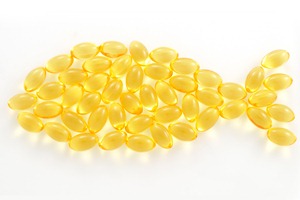 We see articles everywhere these days about the benefits of omega-3 for everything from improving cardiovascular health to warding off the risk of Alzheimer’s. Omega-3 fatty acids are an essential part of our daily requirement of nutrients and something that the body does not produce on its own, so it must be absorbed from the foods we eat. If you do not eat foods that are sufficiently high in omega-3 (vegetarians and vegans fall into this category), then you should probably consider a fish oil supplement. But which one?
We see articles everywhere these days about the benefits of omega-3 for everything from improving cardiovascular health to warding off the risk of Alzheimer’s. Omega-3 fatty acids are an essential part of our daily requirement of nutrients and something that the body does not produce on its own, so it must be absorbed from the foods we eat. If you do not eat foods that are sufficiently high in omega-3 (vegetarians and vegans fall into this category), then you should probably consider a fish oil supplement. But which one?
There are many brands and types of fish oil supplements available, but some are better than others. You want to be sure you are getting the best kind of omega-3 fatty acid in the supplement you take, without the risk of ingesting toxic mercury. First, let’s see what makes some omega-3s different from others.
There are basically three types of omega-3 fatty acids: ALA, EPA and DHA.
ALA is a short-chain fatty acid that is commonly found in flaxseed and other plant sources such as some nuts. The body does not convert ALA to EPA and DHA very efficiently, so taking only a plant-based supplement may not provide you with enough EPA and DHA, depending on how much omega-6 you are getting in your diet (we will explain this below).
EPA is a long-chain fatty acid that is primarily found in fatty fish, with some found in eggs and a tiny amount in seaweed and has been found to reduce inflammation, blood clotting, cholesterol and high blood pressure.
DHA is found in the same sources and amounts as EPA, but its benefit is to be a critical component of cell membranes, the retina, testes and sperm.
The primary reason why some people do not get enough omega-3, particularly if they are vegetarian, has to do with the importance of the ratio of omega-3 to omega-6 in the diet. While omega-3 fatty acid reduces inflammation, omega-6 tends to promote inflammation. The typical American diet has from 14 to 26 times more omega-6 than omega-3, as it contains foods high in omega-6-rich vegetable oils, meat and processed food. Reducing your intake of omega-6 will help to keep your ratios at a healthier level.
The first thing you want to be sure of when looking to buy a fish oil supplement is that it does not contain hazardous metals. Most fish oil supplements are made from small oily fish, such as anchovies, herring and sardines, which do not accumulate the amount of toxins as that of larger fish like salmon and tuna. Nevertheless, you should be sure that the fish oil you buy states that it is molecularly distilled. While it tends to be more expensive than regularly purified fish oil, there are a few advantages.
Molecularly distilled fish oil is boiled under high vacuum conditions, which effectively removes all impurities, including mercury, PCB, Dioxins and other heavy metals, leaving only the omega-3 EPA and DHA. It is also more concentrated, so you get more omega-3 per capsule, and it is less prone to oxidation and rancidity, with less of a “fishy” smell.
DHA concentration is important too. Many fish oils do not have the DHA component in a high enough concentration to be effective without taking a ridiculous number of capsules every day. You should look for a supplement that has 200-300mg per capsule. And keep in mind that this recommendation is not per serving. Some products advertise themselves as having 400mg per serving, however, if you read the label, a serving is often considered three capsules.
If you are low in vitamin A or vitamin D, you may want to consider a molecularly distilled cod liver oil supplement, as it provides these two vitamins along with EPA and DHA. Just be aware that taking too much of either of these vitamins can be toxic, so at some point you may want to switch back to regular fish oil supplements.

